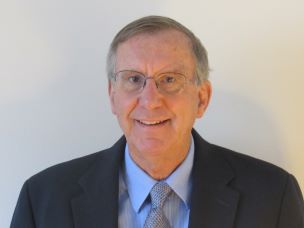As I prepared to retire, I joked with my wife that we could be on HGTV Property Virgins as first-time homebuyers. I imagined the narrator naming the couple and then the camera would pan in on a couple who are 66 and 65 years of age buying their first home! As we prepared to retire from the ministry, of course, we met with the realtor, the financial advisor, and the health insurance agent. But our greatest concern in the first year of retirement was whether we could really live in a meaningful way that continued to reflect and act on our sense of Christian commitment. A pearl of great price that I have read in the first year of retirement is William Willimon’s Aging: Growing Old in Church.
Willimon is the author of more than 150 books with a million copies of his books in print. During my time in active ministry, I benefited from Willimon’s preaching wisdom and inspiration in Pulpit Resource. He has waited until retirement and his senior years to write one of his most practical and thoughtful books. Pastors and parishioners preparing for retirement do not need only a financial advisor but a Christian theological worldview that helps us to cherish the last third of life, be honest about our coming death, and live with the sure and certain hope of the resurrection of Jesus Christ. Willimon’s book explores precisely this.
While this is a serious book, and the subject of aging may be a cultural turn-off, the book is not without Willimon’s humor. For example, here is an elaboration on Ecclesiastes chapter 12 on old age:
“the guards of the house tremble” (that is your hands palsy), “the strong men are bent” (your weak legs get crooked), “the women who grind cease working because they are few” (your teeth fallout), “those who look through the window see dimly” (you are blind)…..” desire fails” (need I spell this one out?), “and the dust returns to the earth as it was, and the breath returns to God who gave it. Vanity of vanities, says the Teacher, all is vanity.” (page 9-10)
The book begins with a helpful short chapter on the biblical view of aging and retirement. Willimon acknowledges that the Bible does not have a great deal to say about aging because people in Bible times did not live that long. He quotes the obvious verses from Psalm 90 about numbering our days, and words from Proverbs about wisdom with gray hair (Proverbs 16:31). The book gives new angles on scripture such as the author’s insightful reflection on Zechariah, Anna, and Simeon, which also brings fresh eyes to the Christmas story. Willimon will not leave scripture behind or confined to one designated chapter of the book, for scripture and theological reflection flow through the entire book.
In addition to the scriptural and theological framework, Willimon draws amply on themes from literature, culture, and social science. He makes use of Shakespeare’s King Lear, whose disintegration of self, family, and friends, set in motion the reality that he is getting old and ought to retire. The example of King Lear forms a powerful negative example of how not to grow old. The flaws of the king in earlier stages of life caught up with him in his old age. Old age forces us into self-awareness about the false gods we rely upon for meaning and purpose in life; thus, the last third of life brings new opportunities for renewal and engagement with God.
The author draws on Richard Rohr’s book on aging. Rohr argues that the first half of life which focuses on surviving successfully and establishing a home, an identity, and a career does not work in the second half of life. This is a good insight, but Willimon is concerned that Rohr is much too positive about the joys of retirement failing to acknowledge the losses, the inevitable declines that do come with aging. He refers to the movie About Schmidt, which is a sad tale of retirement that everyone who is contemplating retirement or moving into retirement ought to see.
Drawing extensively on the Grant Study, the author asserts retirees beyond subsistence level do better; people with more liberal than conservative political views fair better in this stage of life, and those who read seem more adaptable and flexible in the last third of life. And yet repeatedly Willimon returns to a theological vision of aging which he considers paramount: “For Christians, the chief freedom that comes with aging is the freedom to give ourselves more fully to our vocation, our partnership with God in God’s ongoing work in the world….the call of Christ is to fulfill the words of the Westminster Confession to “glorify God and enjoy God forever.” (page 73)
Willimon believes strongly that the local church as part of our Christian discipleship needs to teach about how to grow old: “It is my passionate conviction that Christian congregations are the ideal location for equipping disciples for their vocations and helping people negotiate life’s transitions, especially the stage of life called aging.” (page 125) He backs up this key theme with thirty pages of practical examples of how the church can minister to the elderly and call forth the gifts of the elderly laity of the church. While retiring from active ministry I need the grace ‘to let go,’ I also need to imbibe the theological and practical wisdom of this author who may be writing one of his last books in his senior years.
I rejoice in retirement that I am not left only with the minister’s pension plan and social security, but a great theological, practical, and visionary resource for this next and concluding chapter in life.

